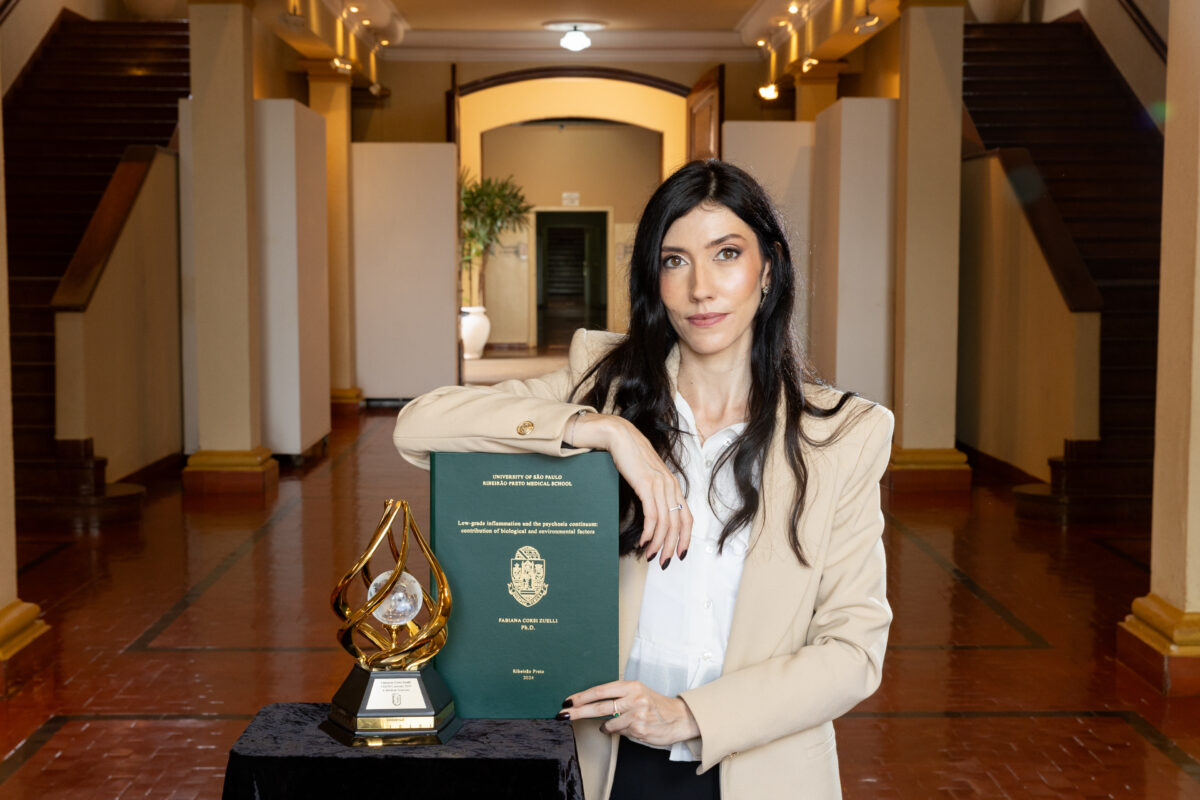 #Careers
#Careers
Using psychiatry and immunology to decipher psychoses
Fabiana Corsi Zuelli, about to start a postdoctoral fellowship in the UK, received an international junior scientist award for her studies on immunological mechanisms in mental disorders
 Fabiana Corsi Zuelli, the first Brazilian to win the USERN Prize, was
recognized for her research linking psychiatry and immunology in the study of
psychoses | Image: Joel Silva
Fabiana Corsi Zuelli, the first Brazilian to win the USERN Prize, was
recognized for her research linking psychiatry and immunology in the study of
psychoses | Image: Joel Silva
Since she was a child, 34-year-old researcher Fabiana Corsi Zuelli of the Ribeirão Preto School of Medicine at the University of São Paulo (FMRP-USP) spent time in laboratories with her father, Edison Zuelli, who was a biomedical scientist. The curiosity that led her into the world of science has now resulted in her becoming the first Brazilian to receive the USERN Prize, an international award granted by the Universal Scientific Education and Research Network (USERN).
The winner is chosen by a council of more than 600 scientists from all over the world, including Nobel and Abel prize winners.
The honor, awarded to early-career scientists, was given to Fabiana Corsi Zuelli for her studies on the relationship between inflammatory changes and environmental factors in the development of first psychotic episodes.
Zuelli spent her entire academic career in the public system. “I faced the barriers of a shortage of physical and personal resources, but with the desire to experience a quality public higher education.”
In 2009, she passed the entrance exam to study a degree at USP’s Ribeirão Preto School of Nursing. In her first year, she received a research grant from the Brazilian National Council for Scientific and Technological Development (CNPQ).
She also participated in Science without Borders, a government program that operated from 2011 to 2017, giving Brazilian university students foreign exchange opportunities. While still an undergraduate, Zuelli visited the UK, where she took part in research into the impact of stress on the development of mental disorders.
Her time in the UK helped broaden her horizons in research. It also paved the way for the Brazilian to study abroad once more during postgraduate studies at the Ribeirão Preto School of Medicine.
As part of her master’s degree in neuroscience, which she completed in 2019, she spent a sandwich period at King’s College London. She then began a PhD (also in neuroscience) with a grant for a sandwich period at the University of Birmingham, UK. She defended her thesis in 2024, with funding from the São Paulo State Research Foundation (FAPESP).
In her research, Zuelli seeks to integrate two fields of health sciences: psychiatry and immunology. Her motivation, she says, is based on personal experience.
“My late aunt was diagnosed with schizophrenia. I experienced first-hand the suffering caused by this debilitating disorder, which also impacts the lives of those caring for patients. My aunt was taken care of by my mother,” says Zuelli.
“I wanted to help, in some way, to improve the quality of life of people with mental disorders, such as schizophrenia. My contribution is through scientific research.”
For almost ten years, Zuelli dedicated herself to investigating immunological changes and environmental factors in the development of psychosis.
Her work was part of a thematic project (with funding from FAPESP, CNPQ, and the Center for Research in Inflammatory Diseases) and an international consortium known as The European Network of National Schizophrenia Networks Studying Gene-Environment Interactions.
Inflammation and behavior
In her investigations in Ribeirão Preto, located in the interior of São Paulo state, Zuelli and her research team identified 588 cases of psychosis between 2012 and 2015. They collected blood samples for analysis from 166 patients.
“We observed that people experiencing their first psychotic episode had higher concentrations of inflammatory proteins, such as cytokines, in their blood than other individuals in the community,” explains Zuelli.
The research also found that people who suffered childhood abuse may be more susceptible to these inflammatory changes. “Individuals who experienced childhood trauma were more likely to develop diseases with inflammatory causes.”

According to Zuelli, individuals with inflammatory changes were also more vulnerable to the negative effects of daily consumption of marijuana (Cannabis sativa).
“The inflammatory state detected in some of these individuals was associated with exacerbation of the symptoms of the disease and a reduction of the brain structures involved in social and cognitive processes,” explains Zuelli.
One of the merits of the research, she highlights, is its interdisciplinary nature. “For a long time, mental disorders were considered ‘problems’ exclusive to the brain,” she says.
“Today, however, we know that there is an important connection between the brain and the rest of the body, and our results support this by showing that organic changes—inflammation detected in the blood—can influence behavior.”
Zuelli points out that approximately 30% of patients diagnosed with psychosis do not respond to conventional antipsychotic therapies.
Identifying inflammatory markers could pave the way for personalized treatments, says Zuelli.
During her sandwich PhD in the UK, she took part in the first clinical trial testing an adjuvant therapy for antipsychotics with a drug that modulates the immune system response, specifically in psychosis patients with inflammatory changes in the blood.
“This is an excellent example of precision medicine, in which therapy is targeted according to the individual’s biological characteristics.”
International recognition
Zuelli has received several international awards over the course of her career, including recognition from entities such as the Schizophrenia International Research Society and the World Federation of Societies of Biological Psychiatry.
At the end of January, she will travel to the University of Oxford, UK, where she will begin postdoctoral research.
“I will continue studying mechanisms related to inflammatory and metabolic changes caused by mental disorders, in order to design new stratified clinical trials,” says Zuelli.
“I believe that in the coming years, the field of immunopsychiatry will move towards increasingly personalized interventions, tailored to individual characteristics, allowing for more effective treatments aligned with the specific needs of each patient.”
*
This article may be republished online under the CC-BY-NC-ND Creative Commons license.
The text must not be edited and the author(s) and source (Science Arena) must be credited.


